
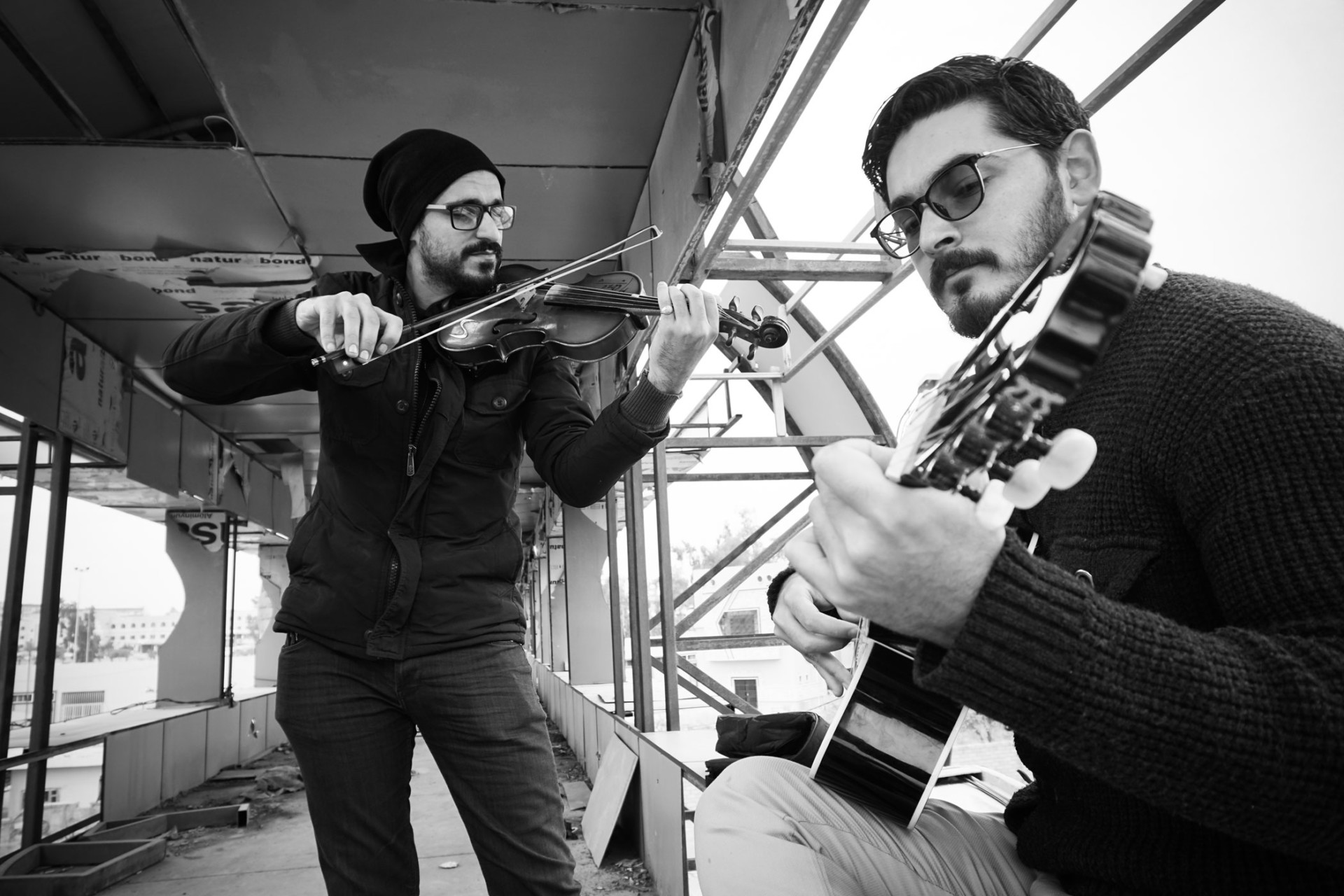
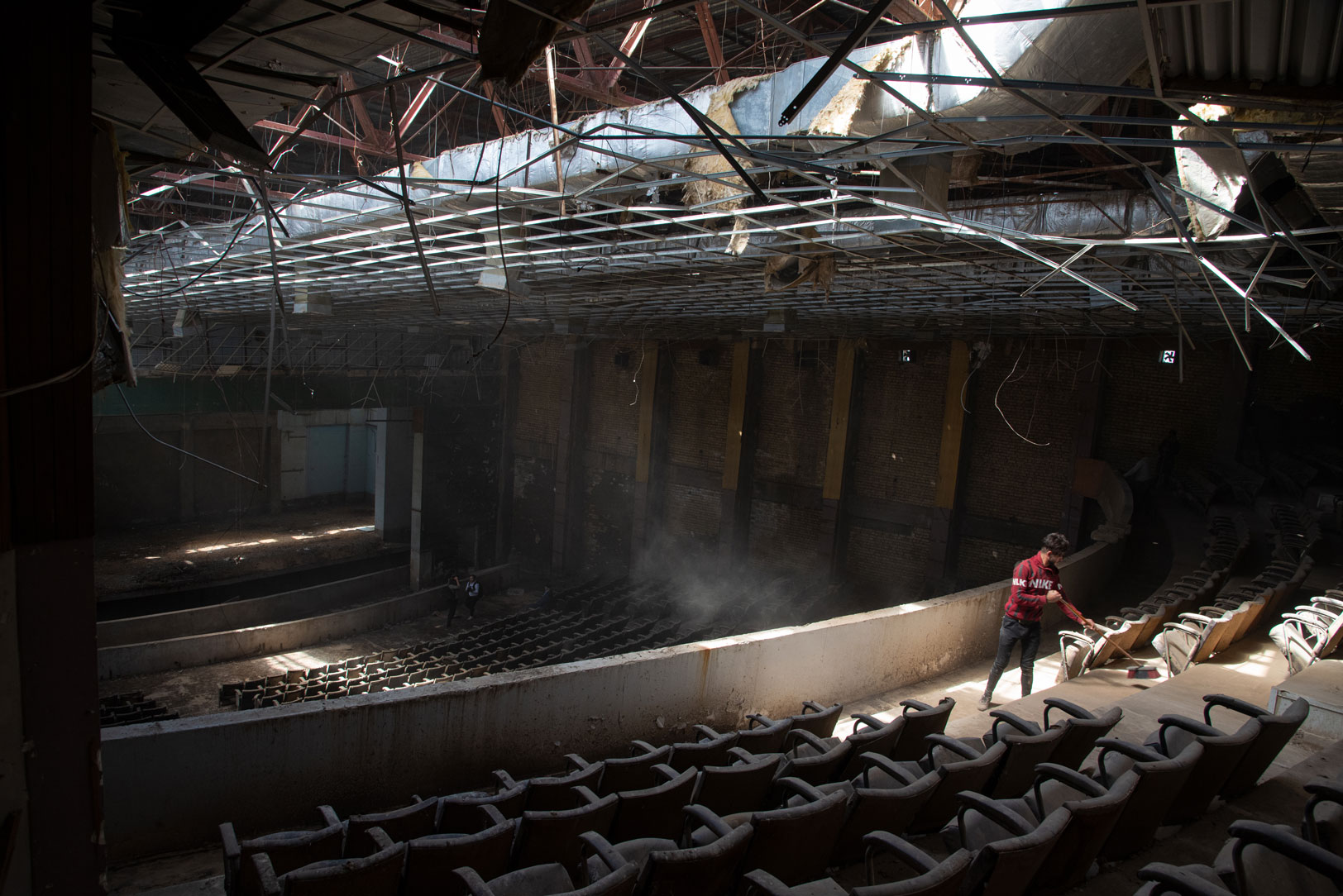
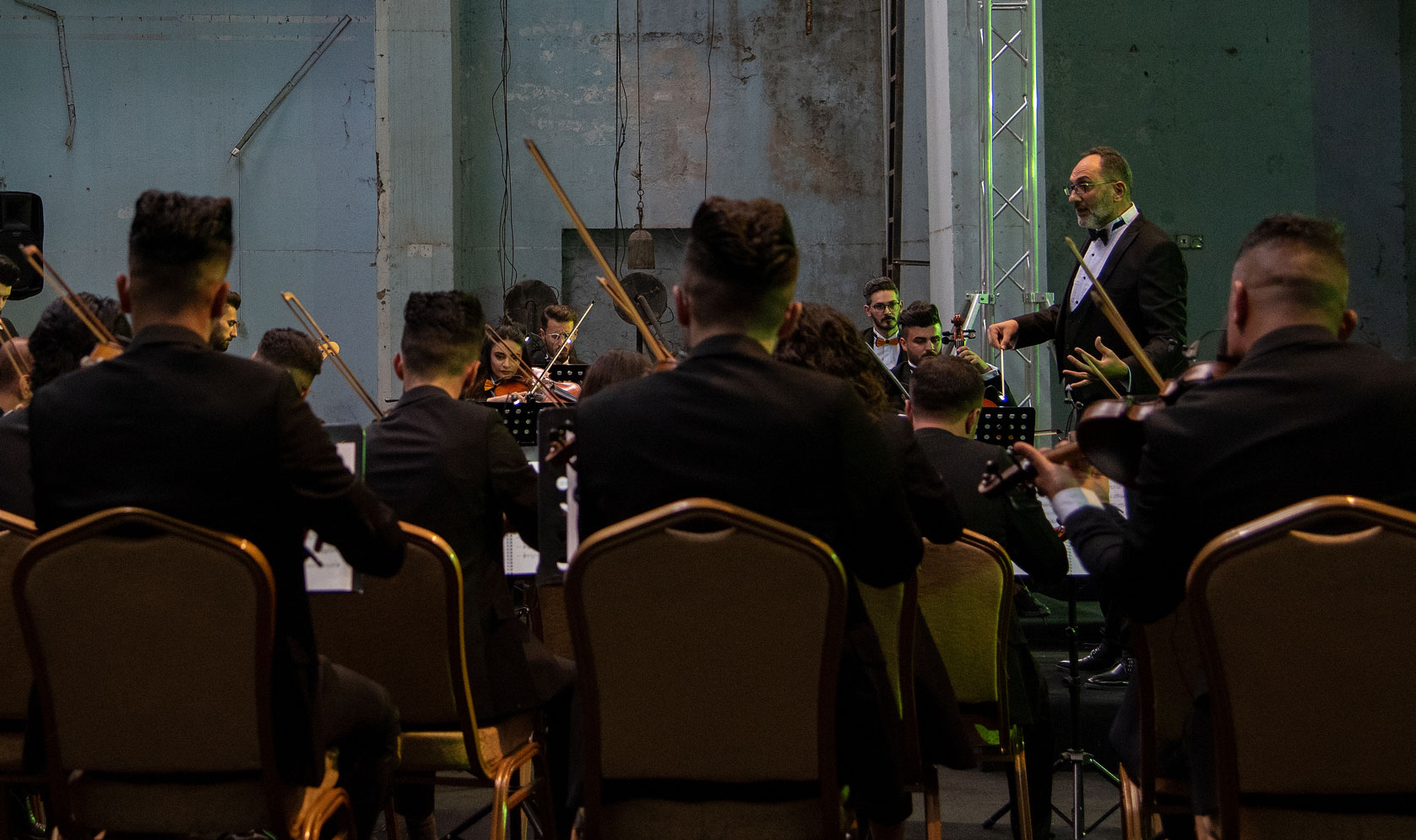
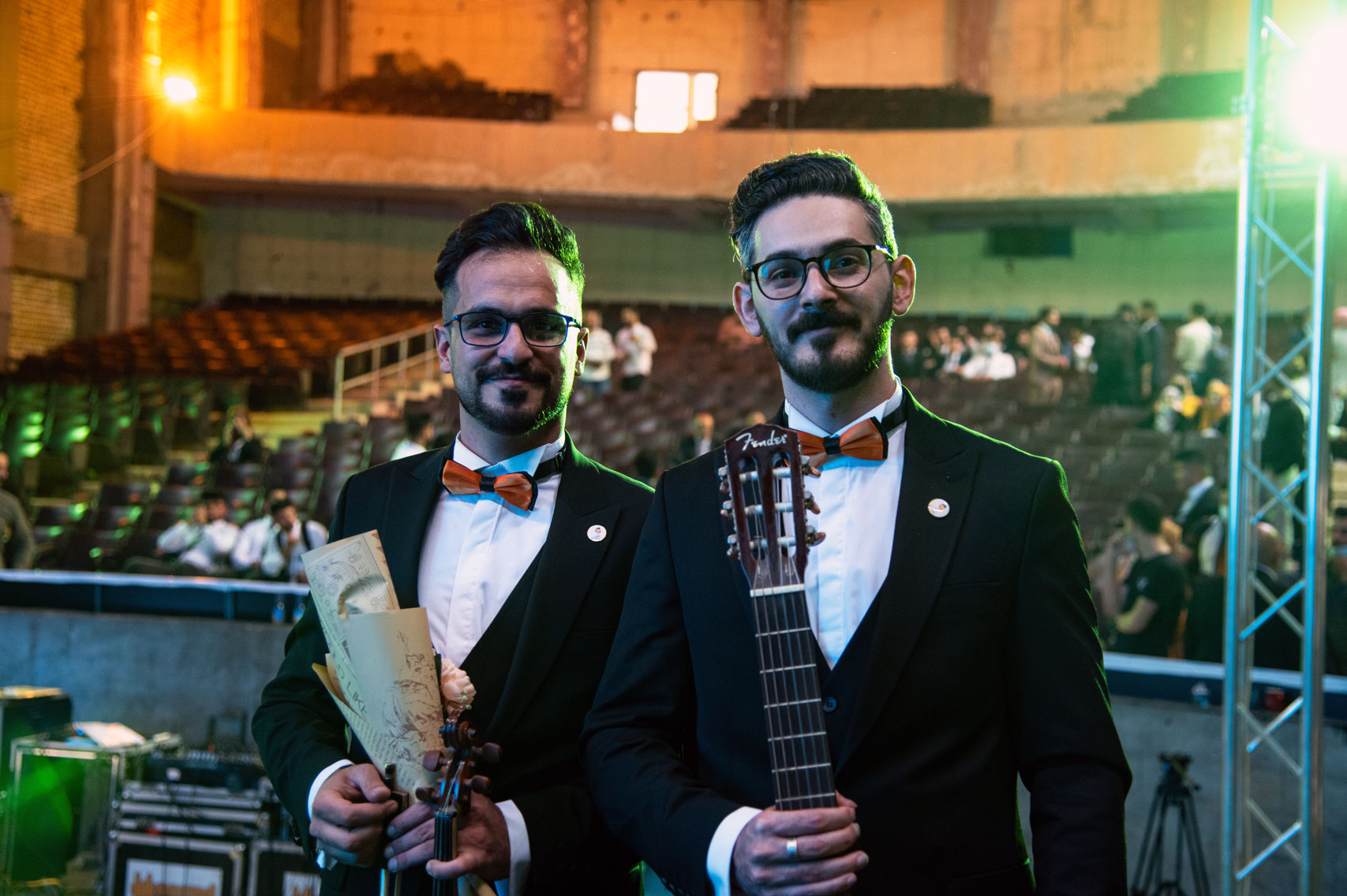
The Music Plays Again in Mosul
The light of song and celebration shines again after a ban plunged the onetime city of art and culture into the darkness of silence
If we want to talk about music in Mosul, it would be unfair to talk only about street players, bands, singers, musicians and theater halls. We may need to dig deep back in history to see how this land has always been well tuned, allowing composers to spread their tastes East and West.
Music has always been composed, played, celebrated and cheered in this city, but also harassed by many ruling systems and groups that walked over its soil. Some hardliners have recently marched the streets of Babylon calling for the abolishment of the city’s renowned festival and concerts held frequently on the Babylonian theatre. Yet the festival was held and many local and Arab singers performed before the thousands who were determined to attend.
Nineveh used to be the capital of the Assyrian Empire. In huge palaces, the courts celebrated with music to receive refined guests and give the kings some comfort. It was not restricted to the ruling elite, though. Music was taught in classes, and played in temples and at burial services, just like in Ur. Musical instruments like leather drums were used for the purpose of frightening a wartime enemy. Archaeological excavations found some stone reliefs representing these instruments, telling us more about their uses and rituals.
Moving forward, during the Abbasid era, the caliph’s court became dependent on the famous musician and wanderer Ziryab (born 789).
Ziryab’s ethnicity may be in dispute among historians, but people seem to agree that Ziryab received his musical education from the famous Ishaq al-Mosuli (767-867), who helped him enter the caliphate court during the era of Haroon al-Rasheed. Ziryab stayed there for a while before indulging his wanderlust and taking off to travel the world. His travels included territories throughout the Levant region as well as sub-Saharan Africa. He spent some time in South Africa before traveling back north, eventually settling in al-Andalus (modern day Spain). There, he was received with great pomp and honor by the then-caliph Abdulrahman II, who offered him a high salary and a fancy palace. He would later establish the first professional music school in Córdoba. In 2013, a statue was erected in the heart of Córdoba to honor his memory and contribution to music.
There are other personalities that connect Mosul with music, like Othman al-Mosuli (1854-1923), credited with having a major musical effect on the entire Middle East. He was a Sufi composer who first came to Baghdad to make a name for himself before traveling to other cities in the Middle East, including Istanbul, Damascus and Cairo, where he was received with a standing ovation. He remains among the most revolutionary musicians and composers who merged religious chants with romantic ballads. Today, a statue of him stands near Mosul Central Railway Station as if greeting travelers.
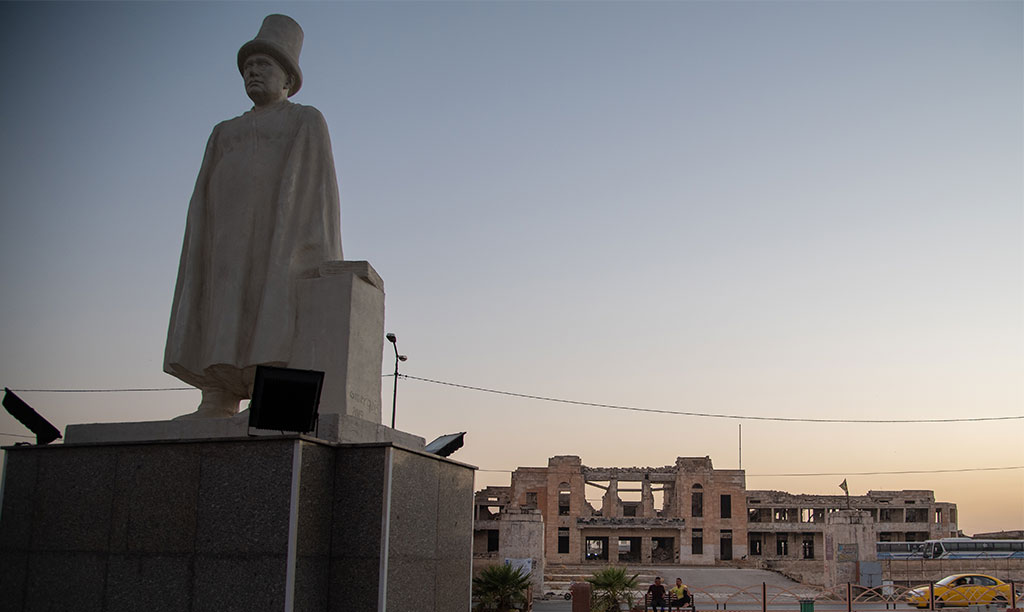
Understanding music requires us to go deep into the social fabric of any city. In Nineveh, each of the many ethnicities had its own musical heritage and traditions. The diversity was reflected in the instruments, tones and even religious practices of the musicians. Sufi Muslims praise the divine love and the Prophet Muhammad through tambourine-toned chants. Their conservative music is usually played on the Prophet’s birthday and the start of a new year on the Muslim calendar. Christians have their own choirs and church bands with hymns and psalms to mark their occasions and events. The same applies to other ethnicities and sects.
Music has always been a style of life for this area. However, musicians are subject to harassment and indoctrination. To understand those chilling effects, I went to Mohammed Mahmood, 53, to try to understand what he and his generation have been through.
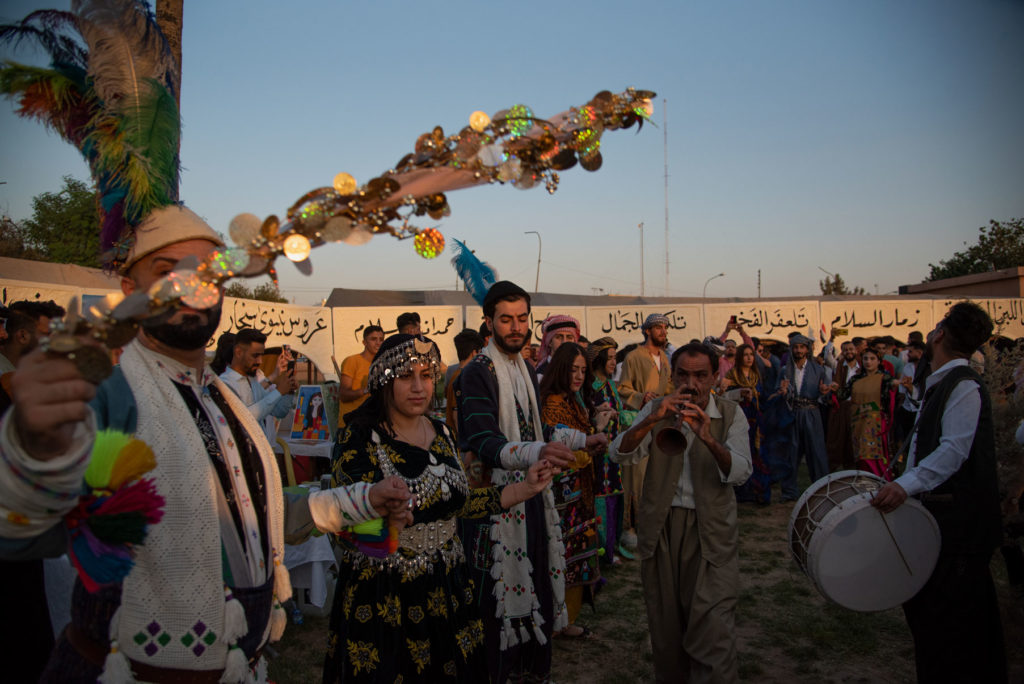
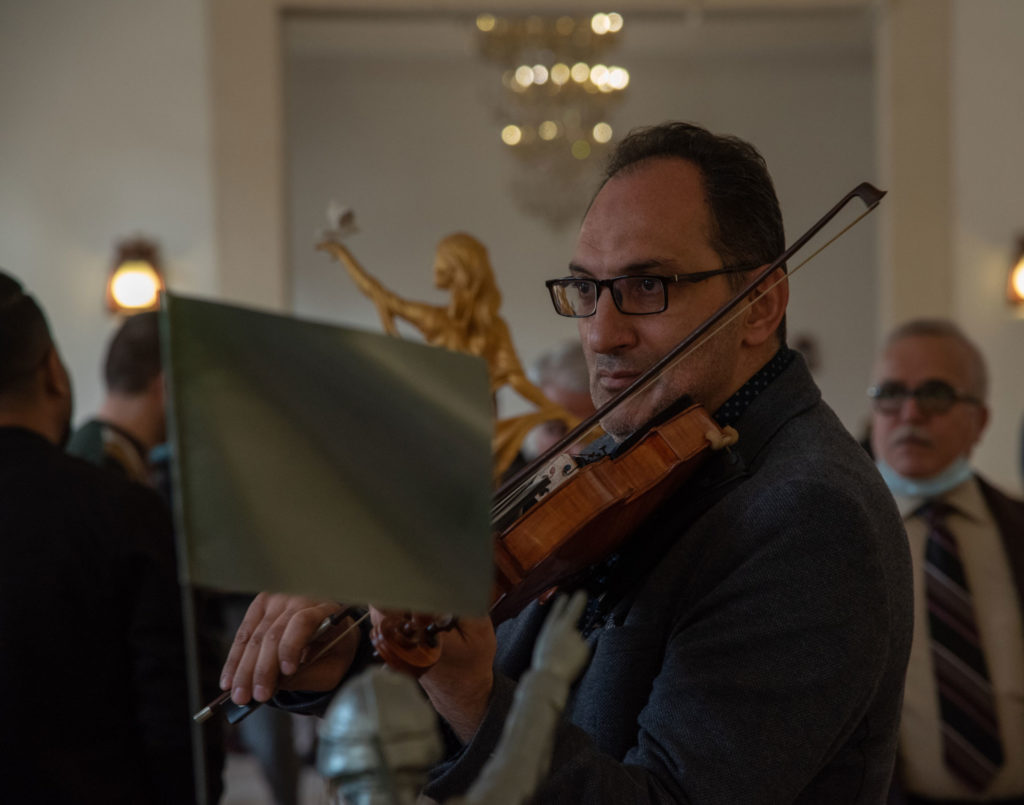
Mahmood was born into a simple family. At age 8, his father gave him his first violin. “I saw a shining ray upon unboxing it; it went straight to my heart before my eyes,” he remembers fondly.
But music and art classes were in decline in the 1970s. There was not enough money and attention given to them. Mahmood did not yield. He started practicing in a nearby youth center. Musicians liked him and introduced him to a local band. He had found a way to develop his violin skills.
However, the Iran-Iraq war that started in 1980 began to dominate everything in Iraq, including arts and music. Youth were mobilized, including those who were singers, actors and musicians, who were recruited to write and compose propaganda songs in support of the war, the military and, of course, Saddam Hussein.
The war ended in 1988 after costing both countries millions of casualties and billions of dollars.
A couple of years later came Saddam’s invasion of Kuwait, which precipitated a 33-country coalition to destroy Saddam’s regime and his military institutions. In the aftermath, Mahmood put aside his violin and joined the army. But his life became empty and out of tune. He could not reconcile the military khakis he wore with the soft music of the violin that continued to play in his mind. So he did what many disaffected Iraqis tried to do: He decided to emigrate.
In many ways the 1990s in Iraq belonged to Saddam’s notorious son, Uday, who appropriated large sums of money to establish his own media empire known as Al-Shabab TV, where many of the country’s singers and musicians performed on a regular basis.
Some singers dissented, however, like the world-famous Kadhim al-Saher, who did not want to inadvertently serve the Saddam regime by performing on the family’s TV network and immigrated to Jordan. Many followed him there, including Mahmood, who at first struggled to make a living but quickly reconnected with a community of exiled Iraqi artists and made a name for himself.
When Mahmood’s residency in Jordan expired, he was forced to return to Mosul, at least for a while until he could renew his Jordanian paperwork. But in Mosul he found his ailing father on his deathbed and decided to remain by his family’s side to help.
It was the late 1990s, and life in Iraq was difficult. Saddam’s oppressive regime had grown even more dystopian. There was hunger and sickness as well as an international blockade that continued alongside U.S.-led bombardment. The people could see no end to the darkness. To even consider learning music was an unfathomable luxury.
The U.S. invaded again in early 2003, and within a month, Baghdad and Saddam had fallen. At first, like many Iraqis, musicians felt optimistic about their future now that the tyrant was gone. Mahmood recalled how he and his fellow artists breathed a sigh of relief, then swiftly rolled up their sleeves and delved into creating music.
But the relief was short-lived, and a new dystopian reality began to set in. Terror groups started growing in Iraq, their members threatening anyone who did not agree with an extreme and warped ideology. Theaters and cinemas became dangerous, often targeted by bombs and other terror measures.
Mahmood recalled how he started working undercover to stay alive, employing cloak-and-dagger tactics that had unfortunately become the tradecraft of any Iraqi concerned about safety. If he wanted to do a simple thing like go to his studio, Mahmood would have to ask his hired ride to drop him off hundreds of yards away so as to dispel any suspicion.
I recall those days as particularly strange and terrifying. One time in 2006, on my way out of campus, I saw the Haybat Khatoon mosque wall had turned white. What’s this? I thought. So I walked over to investigate and found that the whiteness was actually made of scores of hanging flyers called “repentance sheets.” Each had been placed there by its own author, each an innocent Iraqi civilian compelled to announce a mea culpa. The terror groups were forcing people to publicize their “guilt” under threat of violence or death. Among the mea culpas were many written by local musicians, including the name of my friend, Mohammed Salih, a musician and sound system specialist. He would later recall to me how “it was a dark time. We could not whisper or play music. We restricted our activities to private home gatherings. I had to close down my musical instrument shop back then to survive.”
I reached out to more artists to hear about how they survived those dark days. There was Mohammed al-Adwany, 31, who recalled to me how, in 2007, he searched diligently for a music teacher because he wanted to learn how to play the violin. He finally found someone willing to teach him but for a high fee. To evade the scrutiny of the terror groups, al-Adwany would hide his violin as well as he could inside a bag and go to meet his teacher. It was quite an adventure.
I remember during that time how I used to visit an old café where Arabic classic music was played in the afternoon. One day, I ordered my coffee and waited impatiently for the music to start. But it never did. So I went straight to Abu Ealaf, the café owner, and asked him why I was not hearing the iconic songs of the late — and very much beloved — Egyptian diva Umm Kulthum.
“Nobody can play music in a café anymore, son,” he whispered to me, apprehensively.
Mosul had become mute. My city was overcome by fear and horror.
Hakam al-Zarary, a 31-year-old guitarist, was among the more adventurous in 2012 when he and his colleagues rolled up their sleeves, tuned their instruments and together played in an impromptu concert at a shopping mall. Alongside him were Hakam, Ameen Miqdad and others who stood tall on that day in defiance. They were well aware of the high cost of breaking the terrorists’ rules in broad daylight, but like the rest of us, they had grown sick and tired of bowing down to tyranny.
Ameen contemplated his experience and said to me: “They managed to convince many people that music is religiously forbidden in Islam. Those very people still look down on us as wrongdoers. I truly do not care. Public events were almost extinguished back then. Musicians and artists created their own saloons and played music privately.”
Back then, we thought we had seen the worst of the extremists’ tyranny, but we were wrong.
In June 2014, Mosul fell to the Islamic State group. A darker, more terrifying nightmare was just starting. And we understood that the Islamic State must have been in control of our city through their infiltrators and informants for months — or years — before their takeover, which happened without resistance from armed troops who had been there supposedly to protect us. To uproot music, they started with the genre that threatened them the most: Sufi music. Musicians who compose and play Sufi music hold a high status among artists of Mosul. So the terrorists targeted the statue of the musician Othman al-Mosuli outside the rail station and tore it down.
The Sufi composer who at one time roamed the Middle East was uprooted from the public square and destroyed unceremoniously. He had stood there for decades, an icon of Mosul for all those who arrived and departed our city. His musical legacy — the Sufi chants in which the Muslims of Mosul had for centuries found solace — was suddenly forbidden, and the musicians of Mosul felt especially targeted by the Islamic State’s campaign of intimidation.
Some of the artists managed to escape. Others kept a low profile, surviving a reign of terror on a razor’s edge.
- Al-Adwany took his violins and dug graves for them in the garden. He teared upon seeing his beloved instruments lying like dead bodies.
- Salih managed to flee to Kurdistan, leaving his family and music business behind. His music instrument store was later taken by the Islamic State and all the instruments and sound system devices were either destroyed or confiscated.
- Mahmood the maestro remained silent and in hiding in Mosul for a whole year before he managed to escape with the help of a smuggler who took him all the way to Raqqa, Syria. There, he was detained and questioned by the Islamic State and later released. With luck apparently wavering toward his side, it was nothing short of a miracle.
- Miqdad stayed in Mosul and continued to compose music.
- Khalid, a young player of the musical instrument oud, also stayed and kept a low profile, training in secret with al-Adwany. They used to run a small generator in the garden to create noise and avoid being discovered by the Islamic State but stopped when Mahmood was taken by the terror group (he was later released).
Al-Adwany was also taken, for suspicion about his musical, legal and other activities, and was subjected to all kinds of torture. The terrorists used to hang him from his arms, lash him and then — as if the torment were not enough — bring him to an execution field to frighten him.
“I still remember the feeling of being dead,” al-Adwany told me, his eyes tearing up. “It was a time when my eyes were blindfolded and arms tied behind my back. One of them was reading an execution statement over my head with a pistol that I could feel was touching my head. A bullet was fired and I fell down. I fainted. I felt I was dead. I felt I was in a different world. It was like a nightmare. I woke up and was dragged back to my cell.”
He was released a month later, after many Islamic State raids on his house to search for his violins, which were never found. The charges against him were finally dropped.
It was around that time when Ammar, the owner of the most famous record store in Mosul, rushed to his shop and packed up his music archives, stuffing them into a large food container before he smuggled them to Baghdad. They arrived there safely 48 hours later. He knew for sure that his record store would not survive Islamic State atrocities.
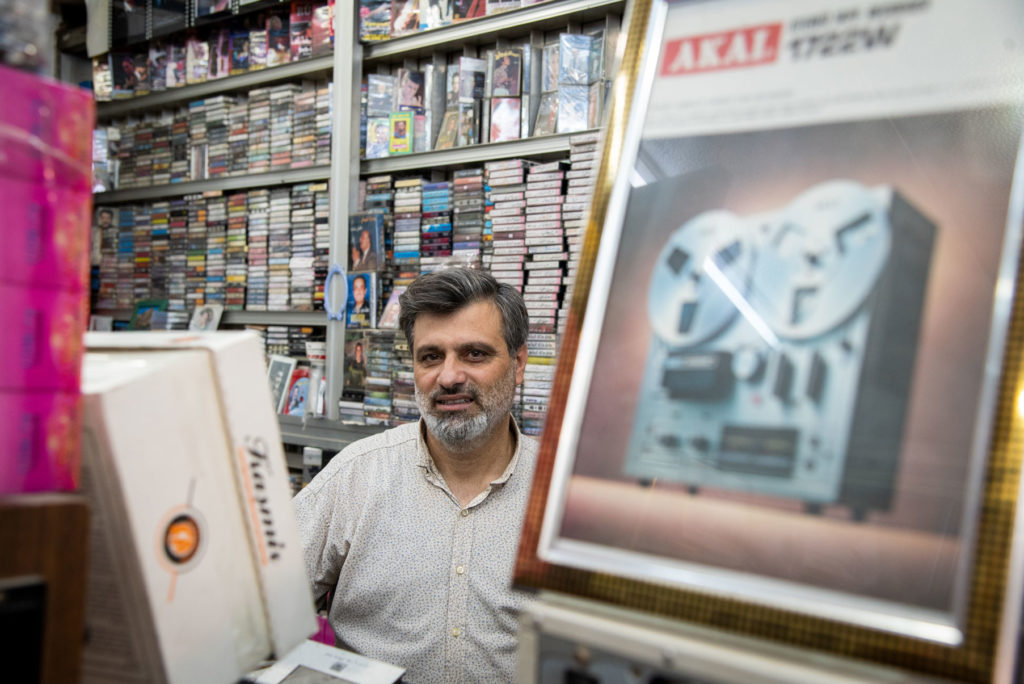
“We have a huge archive of about 40,000 recorded hours and I wanted them to survive ISIS,” Ammar told me with a sigh, using the common acronym for the Islamic State. “I closed the door of the container and felt that my soul was leaving with them as well.”
To keep the Islamic State from suspecting him of any wrongdoing — of loving music, for example — Ammar then turned his record store into a fashion shop and sold clothes, hoping to make a new living.
And so the spirit and soul of Mosul fell mute and deaf under Islamic State rule. Nothing was heard in our streets except for their media centers broadcasting death scenes along a motif of the booms and blasts. I felt like a stranger in my own city. Our daily lives became even more sonically dystopian with the presence of drones, B-52s, A-10 warthogs and other instruments in the coalition orchestra hovering in our skies. Thunderous airstrikes became our music as the coalition aimed to take back our city.
It was so tough on our ears and souls. We had always cherished music, celebrating our spring festival with beautiful tunes and attending concerts at the Ibn Al-Atheer and Rabee theaters. But now all we heard was the sound of death. This was a city that had hosted world-class academics, Arab singers and Western tourists. But now all of that had vanished, replaced with jihadists who came from all over the world to die here, hoping to take our city with them. Even our morning musical ritual within the privacy of our own homes, where so many of us listened to ballads by Lebanese diva Fairuz, was forcibly replaced with the terrorists’ radio station, which cast threats and carried fake news of dreamy victories to conquer Rome. Accompanying the threats was not music but instead only their own chants.
Yet for as long as there was suffering and deprivation, there was also resilience, for such is the human spirit.
I kept talking to Mahmood on how he spent his time in exile. “I never stopped giving music classes to Iraqi schools there,” he told me. While Jordan had welcomed him in the 1990s, “Turkey turned to be my exile this time.”
From his stations in exile Mahmood glanced back at our city under tyranny and serenaded it with his newly composed music for River Tigris Park and the iconic old bridge. He knew he would be back “home” again, just like he had done before, in the 1990s. Alas, he did not know that his return to Mosul this time would be dramatically different. He saw a deformed version of a city. The Assyrian Nineveh Wall that surrounded part of the city with history and elegance crumbled at the hands of the Islamic State. The gates, which used to guard the Assyrian empire, were gone. The Leaning Minaret was brought down to erase the iconic cityscape Mosul once had. There was no trace of a theater or audience in Mosul as well.
Salih, the sound system specialist, talked to his friends in Erbil, and they worked together to start a new media platform. They called it Al-Ghad FM, or Tomorrow FM, and gave Mosul a voice, allowing its people to connect with each other. Everyone used fake names on air to protect their identity, and so the ruse worked.
Months passed without any public art events. The Dawwasa and Aleppo streets, known for decades for hosting the best theaters and cinemas, had fallen silent. The ringing bell of the theater was muzzled.
The first time I heard music in public was on Jan. 8, 2017, as the Iraqi security forces played excessively patriotic songs from their loudspeakers to let people know that the Islamic State was gone. A new era had arrived. After more than 15 years of fear and intimidation, Mosuli musicians could finally break through the blanket of terror and silence and play music in public again. The Islamic State had left no theater in place, destroying and burning to the ground any semblance of art or civility.
But that did not kill our spirit. Musicians staged concerts over the rubble of war, helping all of us reclaim our city. They played music in the bombed and burned central library, over the remnants of the Islamic State media center and in front of the six-story insurance building that the terrorists had used to execute people by throwing them to their death from a high tower.
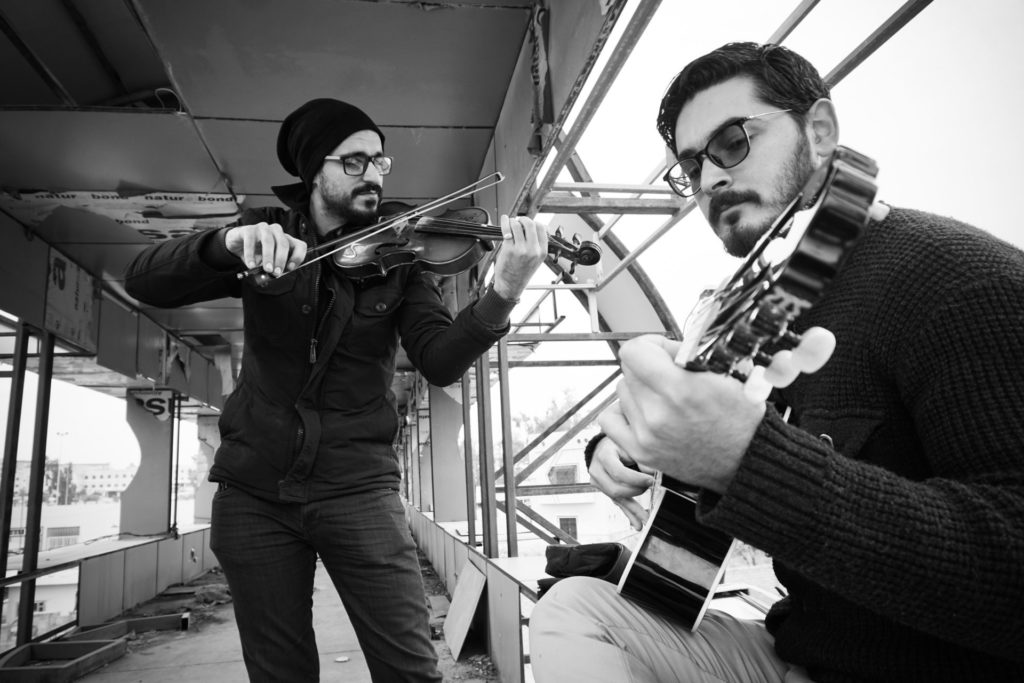
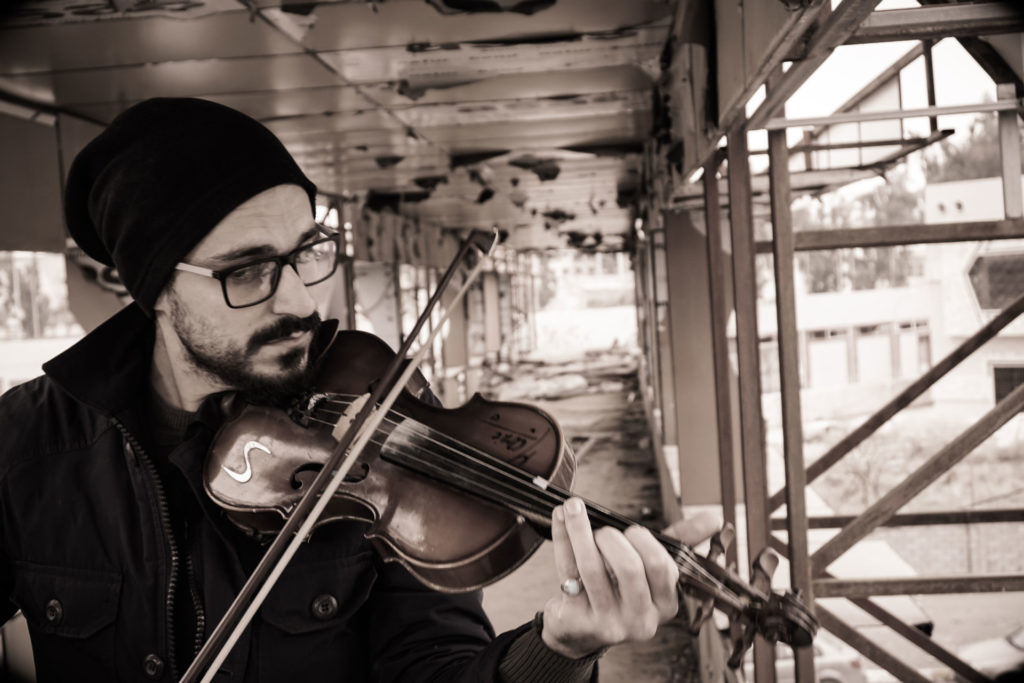
Al-Adwany, who had survived what seemed to have been an attempt to execute him, finally excavated his violin from the garden. “I teared up upon seeing the first one had been destroyed. But my face radiated when I found out the other one was still intact,” he said.
Khalid restored his oud instrument, and Hakam carried his guitar in broad daylight. It was time to spread the music and let people know that Mosul as we had known it in better days was back. This message extended beyond the city, as the musicians drove to Baghdad and played their tunes at a TEDx event there, receiving honors and applause. Their music went viral. They flew to Brussels to play. They never forgot their grand ancestor, Othman al-Mosuli, the one whose statue the Islamic State had torn down, and they honored his memory while abroad. Hakam proudly recalled to me how the Western audiences “were taken by surprise; our music haunted them.”
In Mosul, their music was played more loudly and frequently than at any other time that I could recall. New bands and orchestras visited Mosul and played in full houses. As Vivaldi’s “Four Seasons” played by the River Tigris Park, it moved Mosulis to tears, inspiring our artists to rebuild the music houses.
Al-Adwany made the announcement proudly on the stage in Brussels. “We need an orchestra and a theater,” he proclaimed. Salih and Mahmood met in mid-2020 and started discussing how to make this dream a reality. They resolved to start a movement in the city to attract amateur musicians, train them and build an orchestra. Al-Ghad FM sponsored this challenge. Mahmood and Salih planned the details. Many young people started applying for the program through an online portal.
“It was surprising to us to see young people applying to the orchestra from outside Mosul, from Bakhdida, Bashika, Duhok and other cities as well,” Salih said. Mahmood reiterated to me the importance of preserving the musical heritage of Nineveh and composing new pieces to capture Mosul through music.
The duo settled on 34 musicians to form the orchestra. They started rehearsing twice a week. On numerous occasions I attended their rehearsals and saw the music in their eyes. Their studio is next to the Assyrian Nineveh Wall, where music played regularly thousands of years ago. It was glorious!
More recently, as the COVID-19 lockdown took hold, the promo video of the orchestra has been put online. The pandemic was not going to stop us, and Mosulis celebrated the music from their home computers. The orchestra played on top of the rubble of the Tahira Church, abandoned theaters and other forgotten ancient sites to attract attention to Mosul.
One of the organizers took me on a tour of the Rabee theater, where the orchestra was to play its first concert. It’s a place that holds deep emotional meaning in Mosuli memory. Before shutting down, it had held concerts, poetry recitals and cultural events, especially during the annual spring festival. Iconic poets and singers from the region, like Qabbany, Baraduni and Warda Al-Jazaeriyya, performed to full houses and standing ovations.
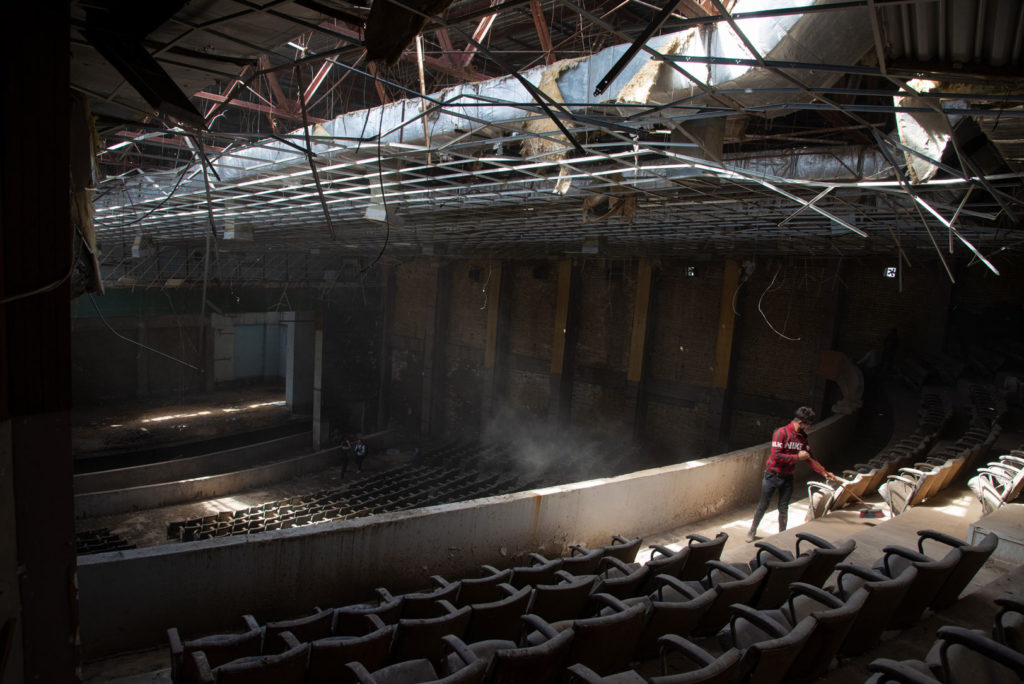
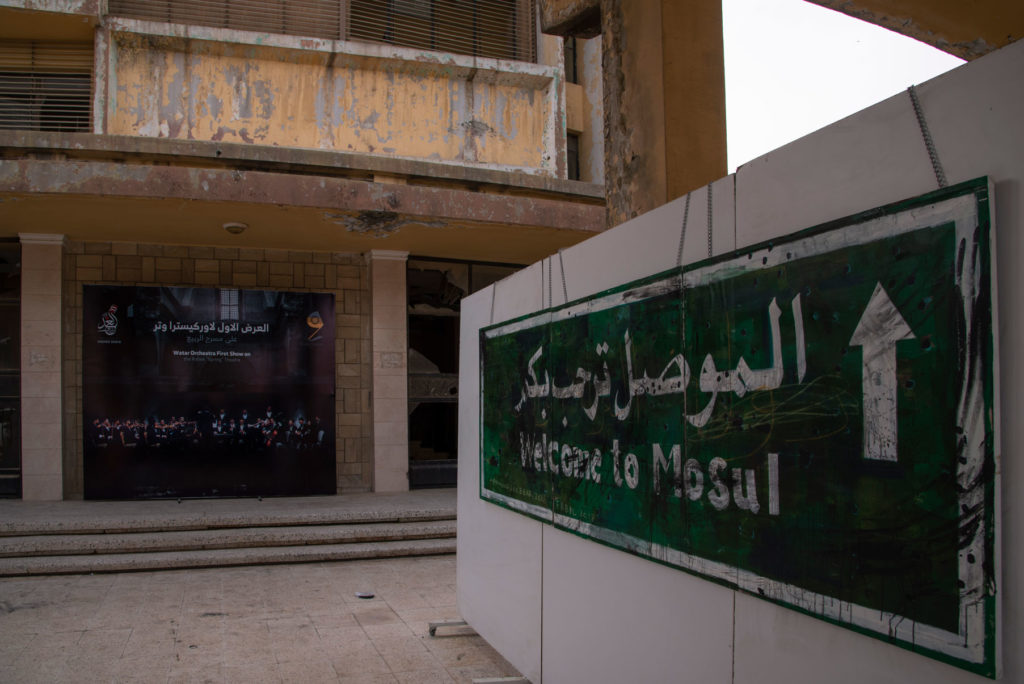
Unfortunately, I recently found the concert hall looking shabby and abandoned, its windows broken and metal bars left hanging from the ceiling. I entered the reception area and accidentally stepped on a nail. The place was dusty, stinky and pale. I climbed the stairs to see the infamous Islamic State graffiti that had tormented us during their rule.
“The caliphate remains and extends,” the taunt said, bringing back bad memories. There was no door to the theater, probably stolen by the terrorists, as they often looted and sold what was not theirs to take. Dust had settled on the rows of seats.
The organizers of the concert had not fixed or decorated the theater. They kept it as it was to send the message that Mosul was rebuilding and needed a new theater just as it needed hospitals, an airport and a railway station.
Amid the emptiness I heard a noise. Some workers had already begun to remove the dust and rubble, and their work looked tedious and boring. I was disappointed seeing the slow process of rebuilding, so I left the theater and resolved instead to attend only the rehearsals. I watched the young musicians create their harmony; the hymns of Nineveh sung anew.
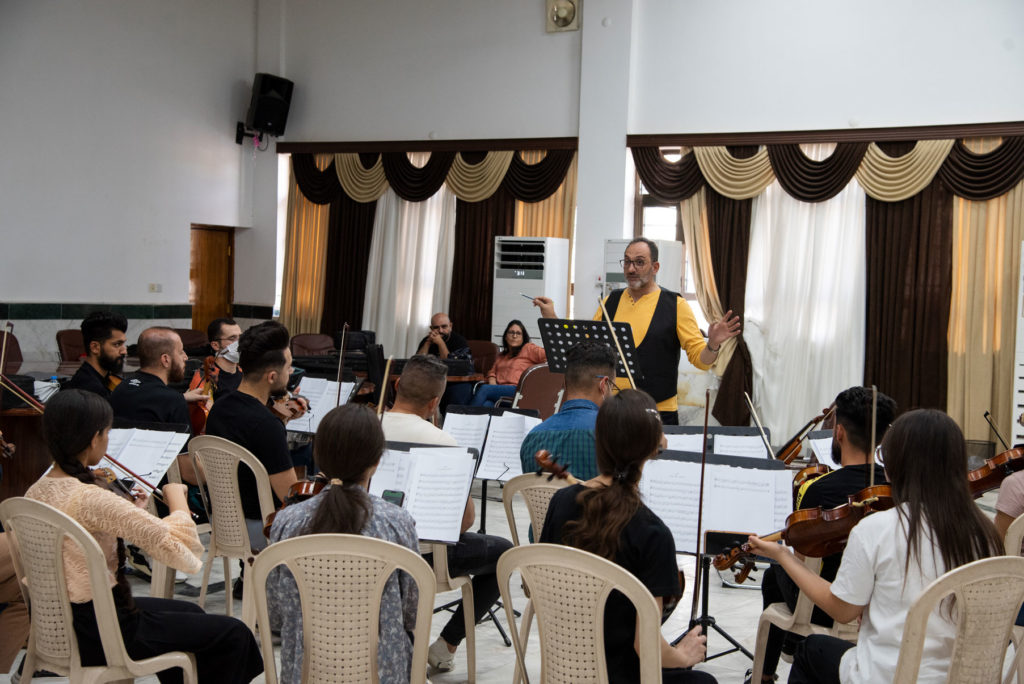
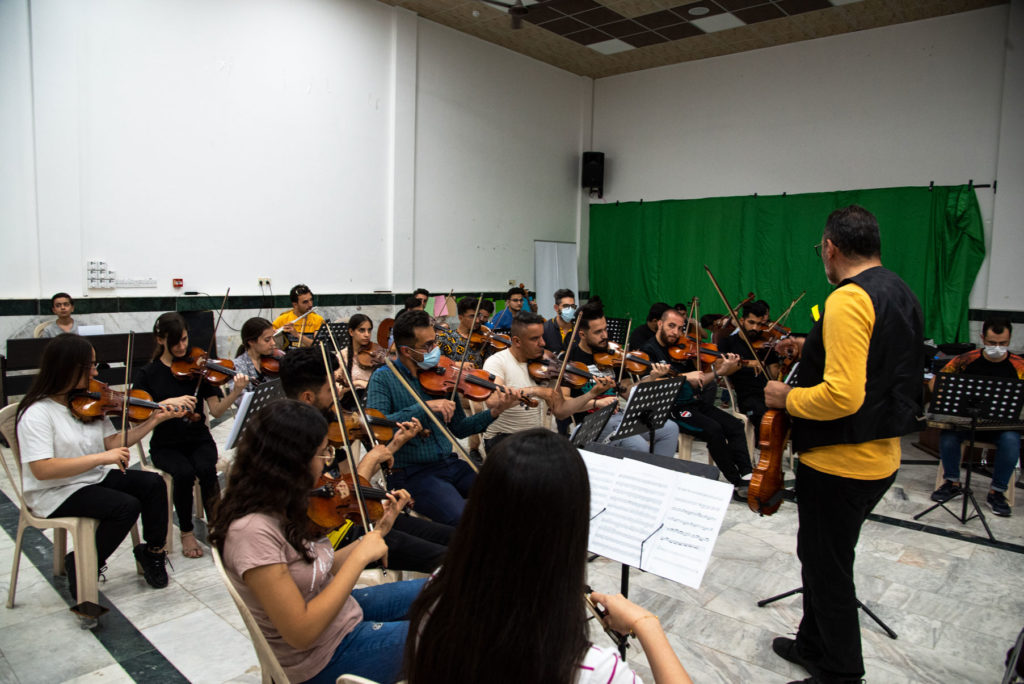
A link for the rehearsal popped up on my smartphone, and I swiftly clicked on it and made my first-ever online reservation in Mosul! One of the concert organizers, Asmaa al-Rawy, 24, used to be one of my English translation students on campus. She was now working in a local enterprise, where scores of volunteers had joined to clean up the theater and prepare it to host the orchestral event, with an expected audience of hundreds.
I revisited the theater a day before the scheduled concert. It looked completely different from the previous time I saw it, but not because it was fixed up. The iron bars still dangled from the ceiling, the walls were still sullied with Islamic State graffiti, and all the broken seats remained broken. But the place was no longer dead. It had come alive. Volunteers were still working like bees in their hive preparing the place for the concert.
The musicians checked out the venue, climbing on the shabby stage with scratched walls. But on the positive side, there was good lighting and an excellent sound system.
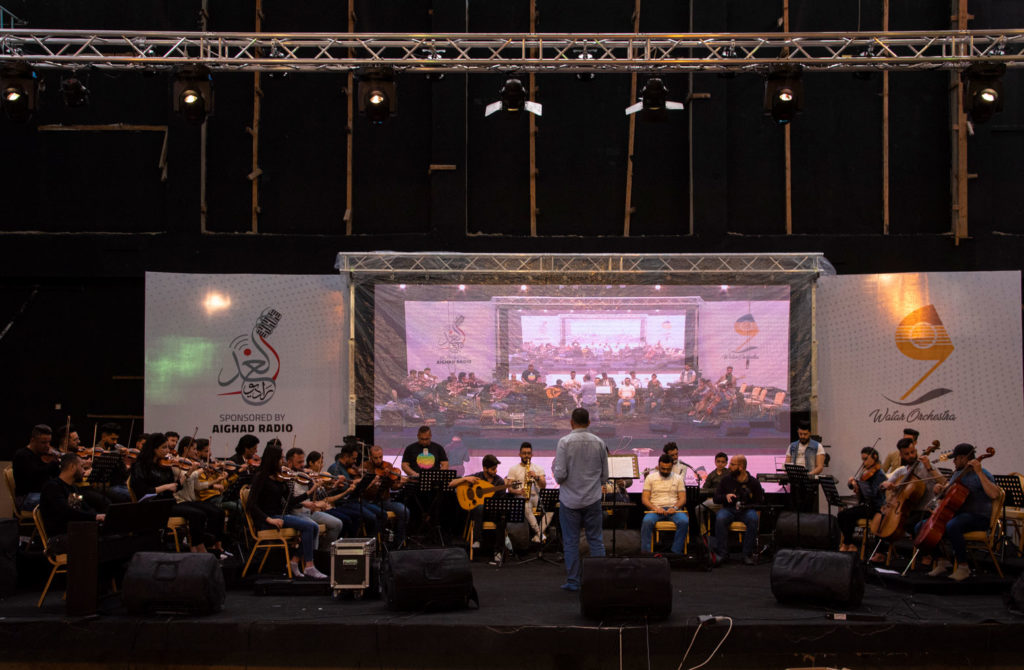
At the concert the following day, I found that in spirit, it was like the Royal Albert or the Bridgewater Hall. Hundreds flocked into the theater from all over Nineveh. The musicians’ families sat near the stage where they could greet their sons and daughters. The staff members rushed around, making last-minute preparations.
When the music started, I was mesmerized. They were like jewels of Mosul, dressed in black suits and white shirts, playing harmoniously.
The concert opened with “The Return to Mosul,” which maestro Mahmood had composed during his exile in Istanbul, when he contemplated whether he would ever return home.
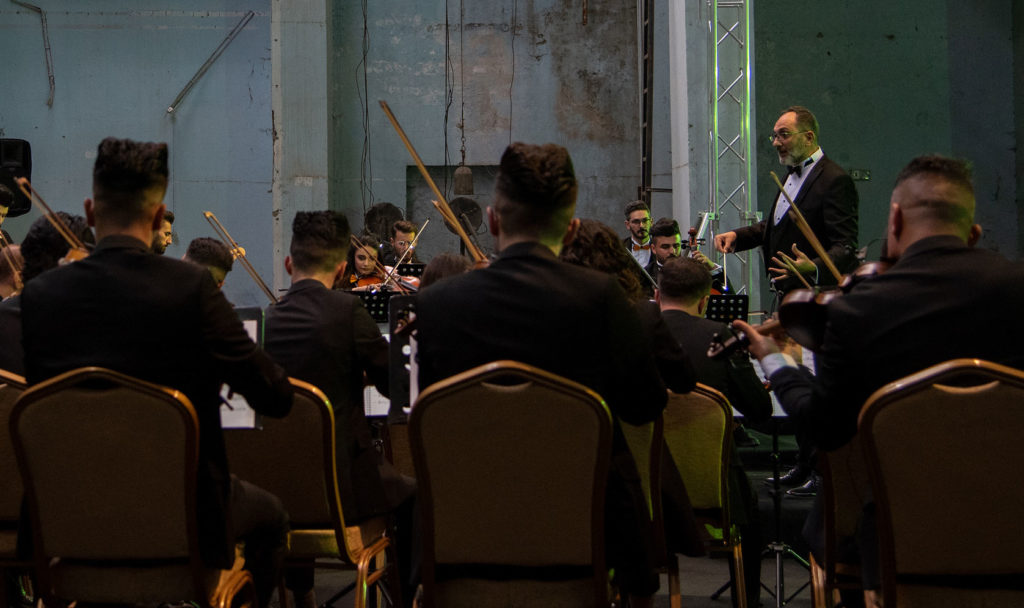
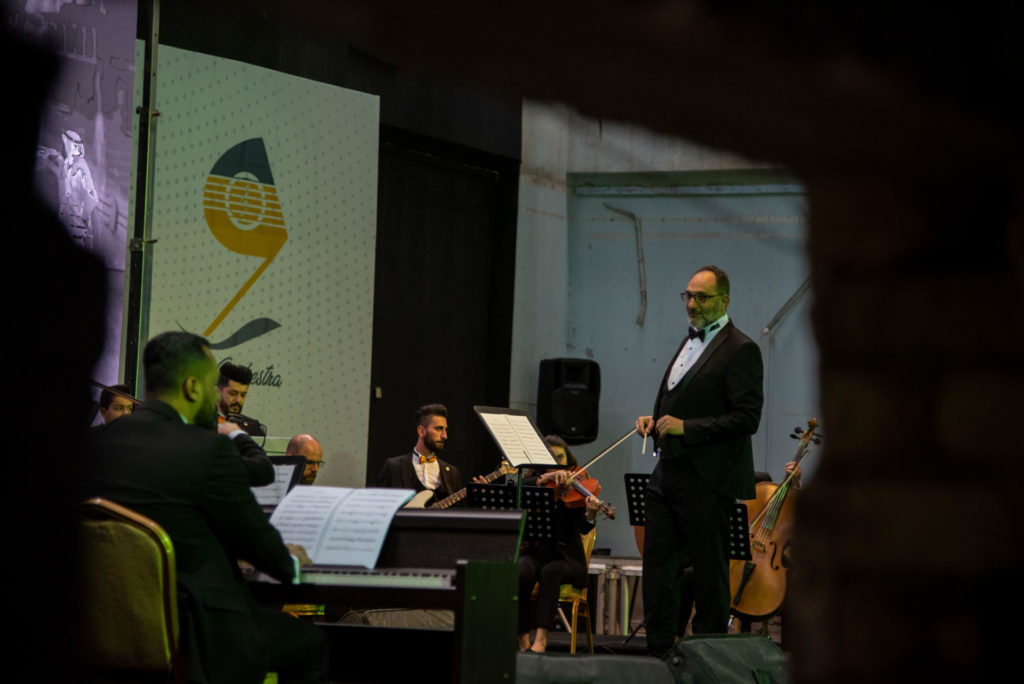
But there he was, leading the first youth orchestra in the city. The audience was stunned at first; in between the notes, I could hear a pin drop. At the conclusion, the audience erupted into applause and gave a standing ovation.
Hamza, who at age 14 is the youngest pianist, mastered Clint Mansell’s “Requiem for a Dream.” Nashwan, a 24-year-old who plays the qanun (a regional string instrument), had come to Mosul to join the orchestra and play a solo piece that amazed us all.
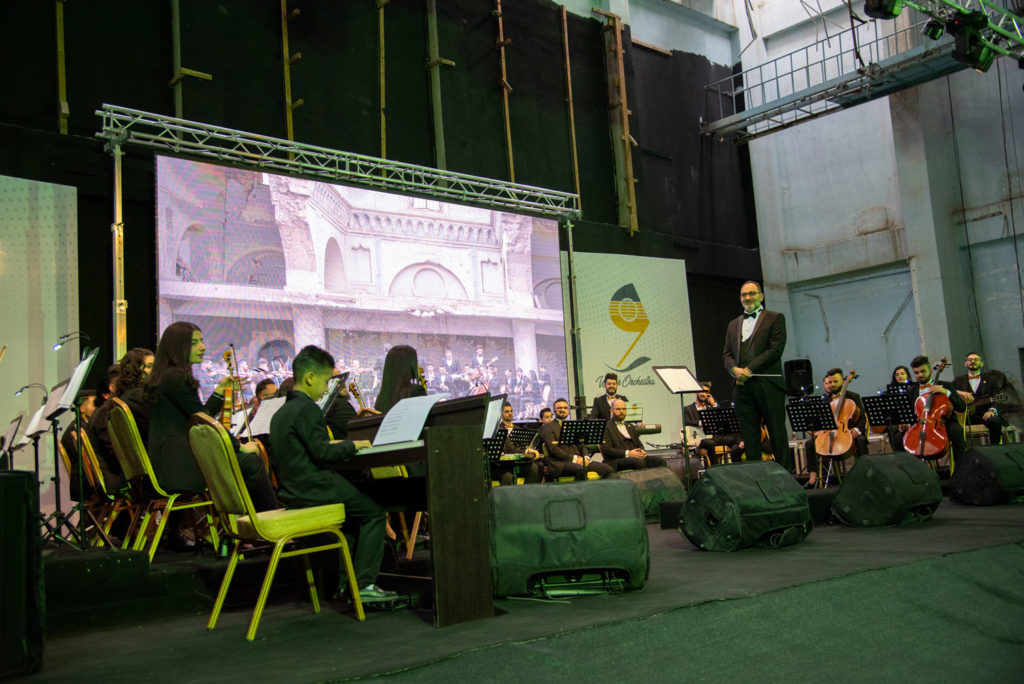
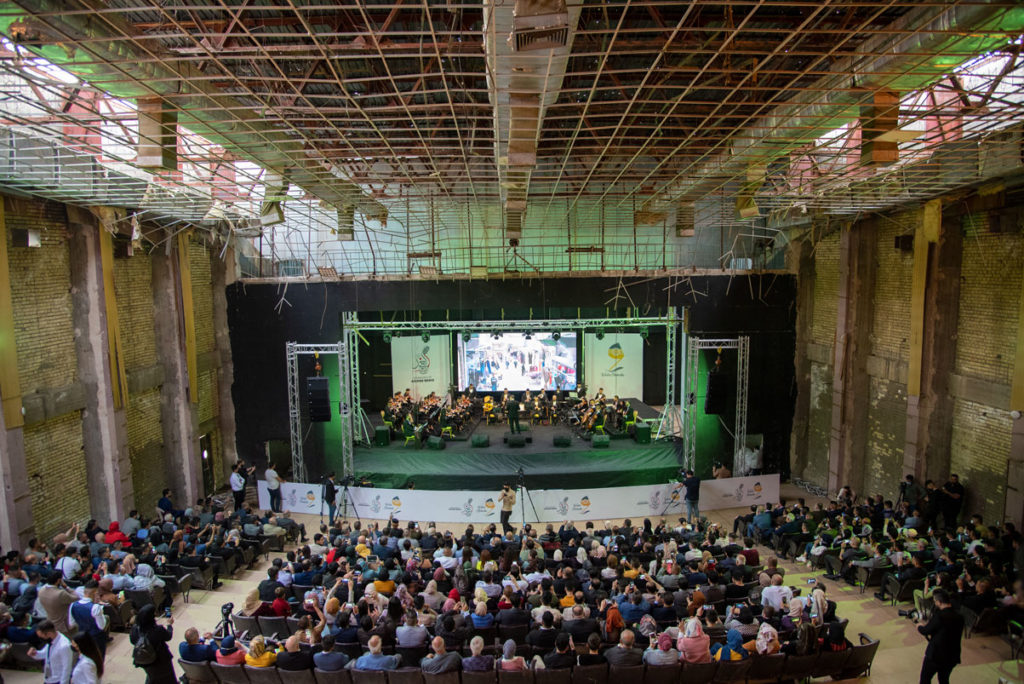
A number of Assyrian Christian girls were in the orchestra. They had never been to Mosul before joining the group, having been encouraged to do so by their church choir teacher. Tara, a 16-year-old violinist, started playing violin while in exile after she and her family fled when the Islamic State took Bakhdida in August 2014. Her friend Dalya, 24, is an undergraduate student in psychology. She has big plans. She will combine her music skills with her academic training to develop new therapy techniques for the people of our war-torn country.
Behind the scenes, I found the maestro looking sad,, his face uncharacteristically long. He had composed one of the concert pieces in memory of his lifelong friend, Wathiq al-Ghadhanfary, who was assassinated by the Islamic State in March 2014. Al-Ghadhanfary was a historian and Mosul heritage specialist who loved the city, and many had hated him for it. The piece sounded haunting and tragic, and it was not just about him. It was a lament commemorating all the innocent Iraqis who were killed by tyrants.
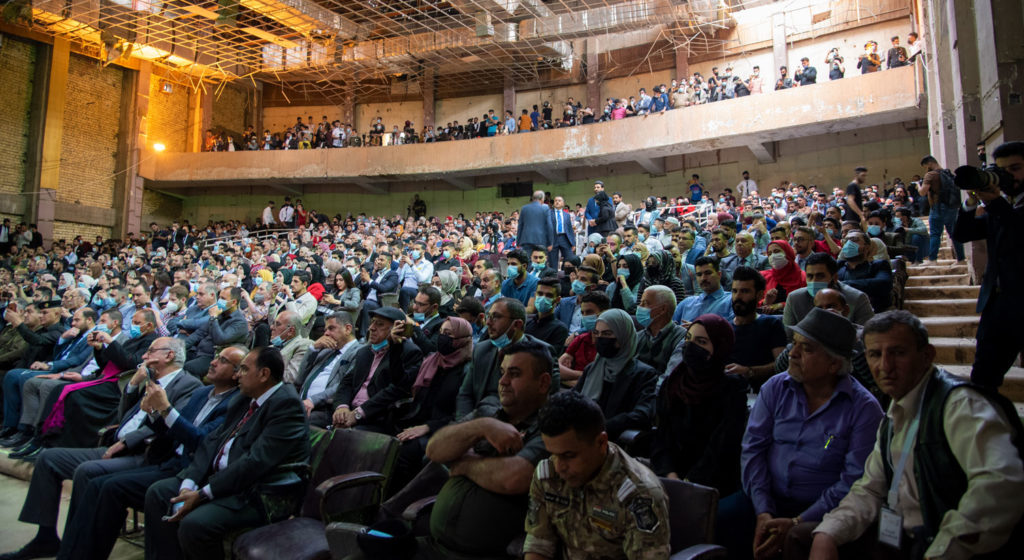
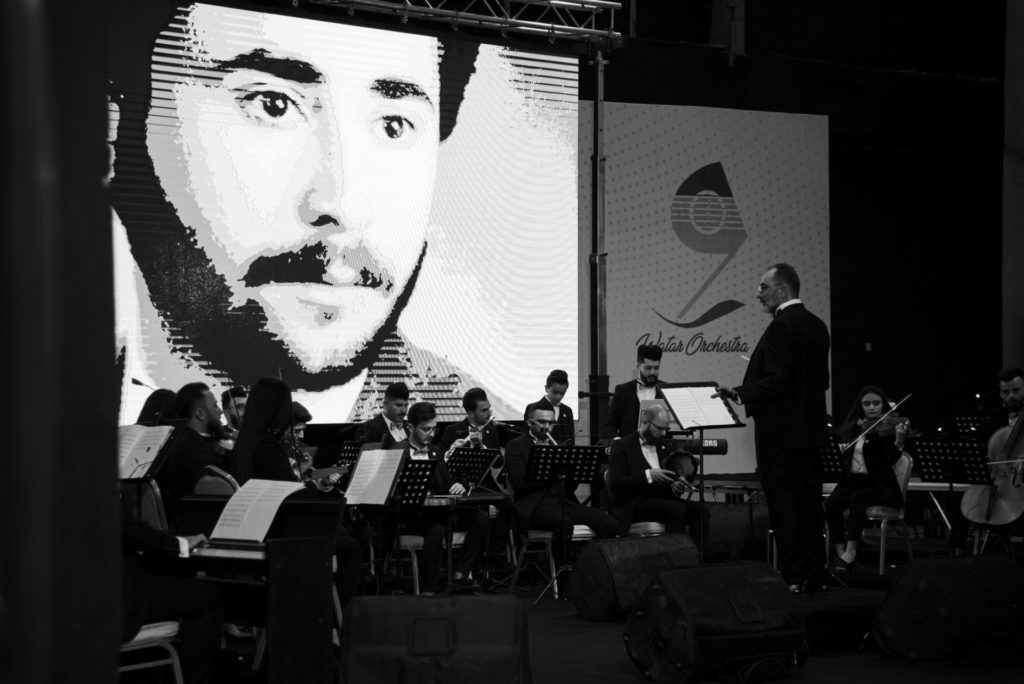
The audience was moved to tears, especially as a black-and-white portrait of al-Ghadhanfary was projected on the back wall. When the piece ended, a grave silence befell the house, followed again by a standing ovation.
And that was how the concert première concluded. Music was back in Mosul, though in a different way.
I looked at the musicians, whose ages ranged from 14 to 51, encompassing three generations who had gone through various types of tyranny, occupation and terror. All this trauma must have left its scars, but the music can still enchant us all.
The maestro is back home in Mosul, along with many of the previously displaced musicians. Ammar has reopened his cherished record store and is working on archiving Iraqi and Arab music. The campus theater hall is being rebuilt, and the statue of Othman al-Mosuli is back on display by the railway station, waiting for the toots of trains that bring new visitors.
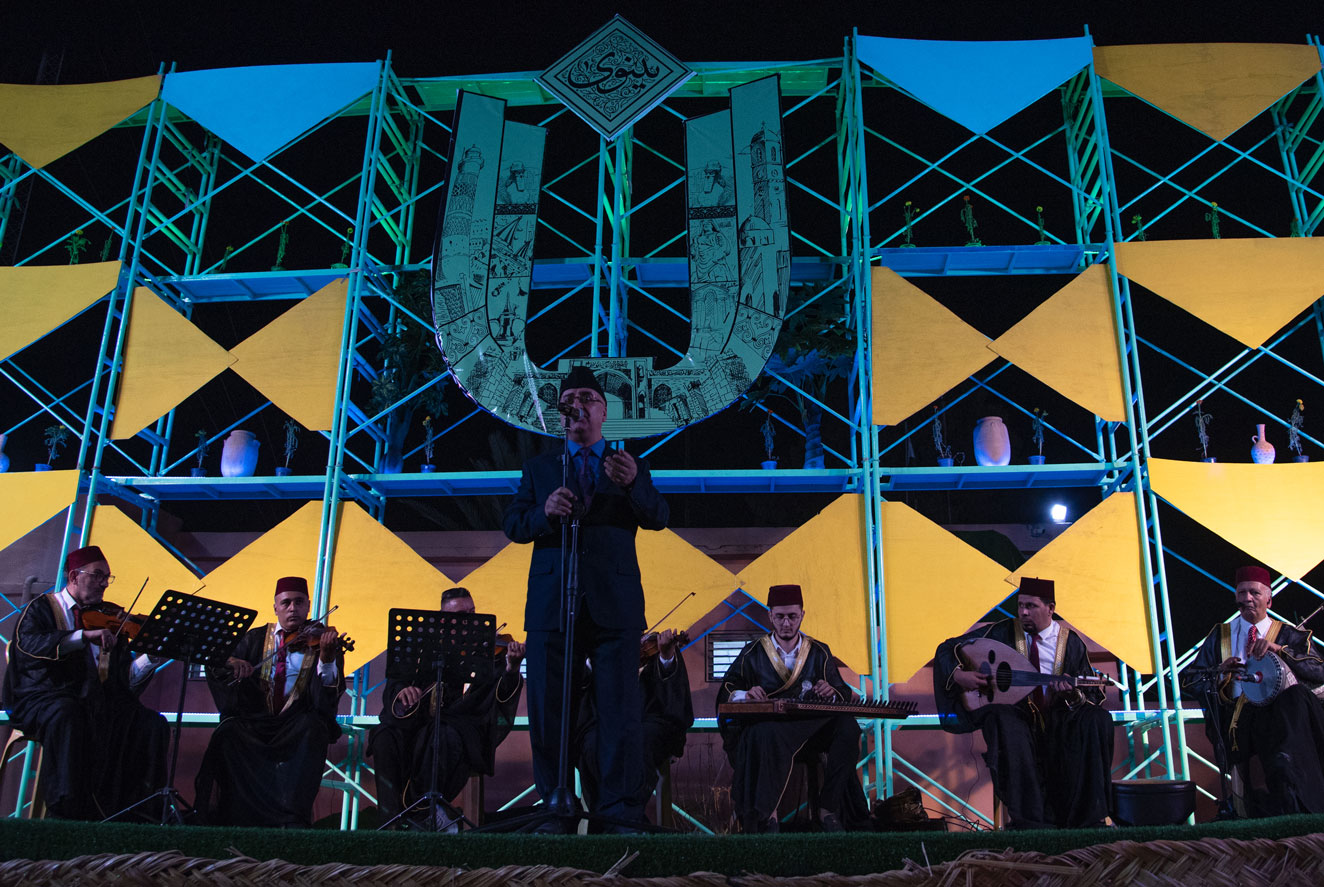
A local folkloric band is onstage at the Peace Festival, which aims to revive local music. Photo taken October 2021 / Ali Al-Baroodi
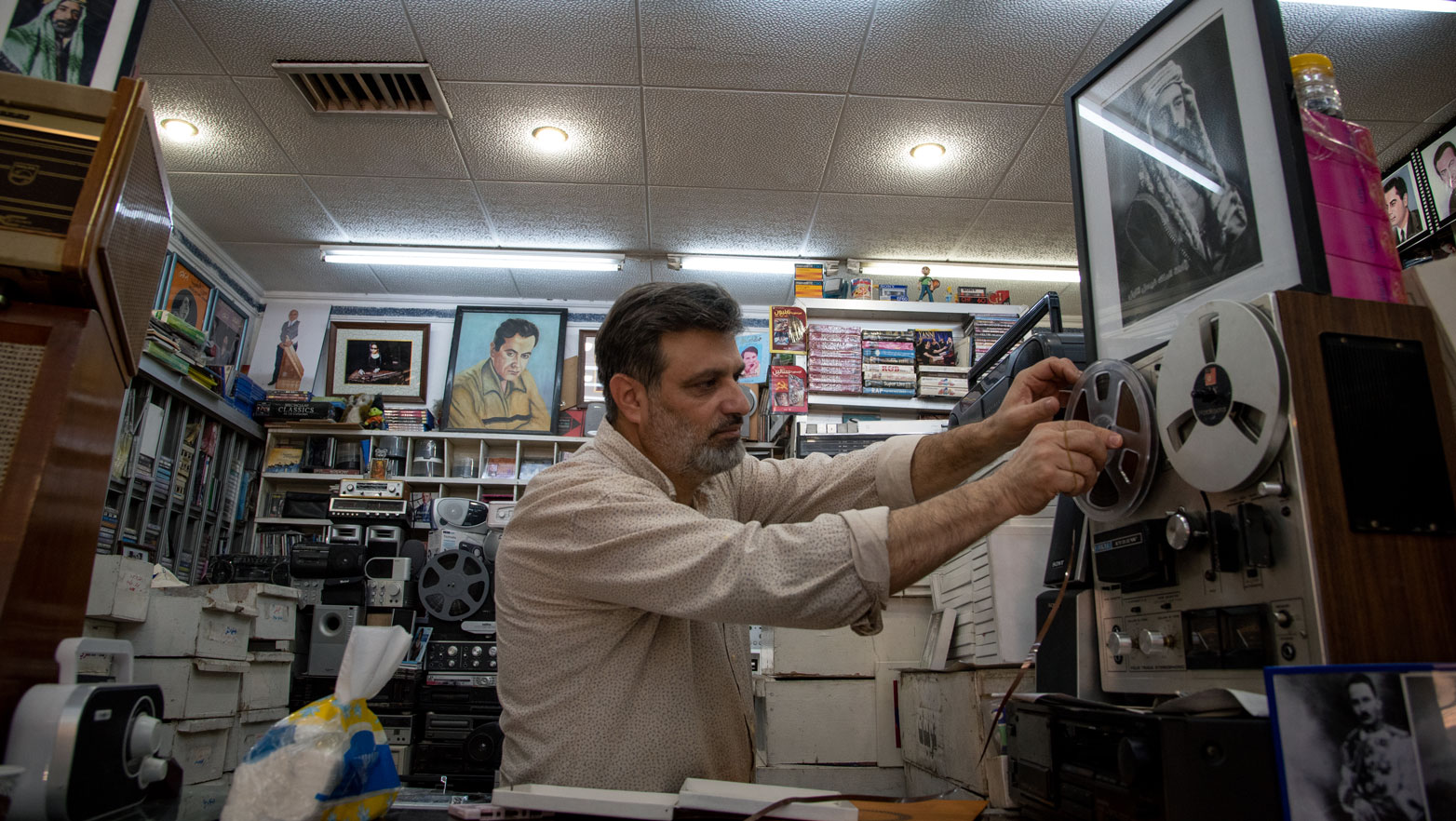
Ammar stands in his record store where he archives Iraqi and Arab Music. Photo taken October 2021 / Ali Al-Baroodi

Concert premiere of the Watar Orchestra at the famous Al-Rabee Theater. Photo taken April 8, 2021 / Ali Al-Baroodi


